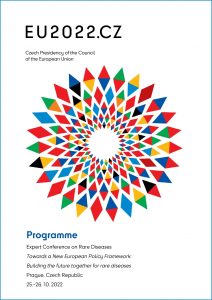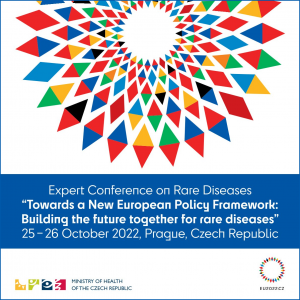Towards a New European Policy Framework: Building the future together for rare diseases
Expert Conference on Rare Diseases
25 – 26 October 2022, Prague, Czech Republic
This expert meeting Towards a New European Policy Framework: Building the future together for rare diseases bridges a series of technical and ministerial gatherings on proposals for a renewed strategy for rare diseases following the Slovenian and French presidencies.
In the spirit of continuity stakeholders in the rare disease community are particularly keen to continue discussions on rare diseases and focus on how the Czech EU Council Presidency can take continued steps towards a coordinated strategy for rare diseases that better addresses current unmet needs by setting meaningful goals for patients, families and for society at large integrated at the national and regional levels.
Despite tremendous progress demonstrated by the measures already implemented and the ongoing commitments and major investments in addressing the challenges of rare diseases from the side of the European Commission, the need for an updated framework of EU actions and support for national plans and strategies on rare diseases remains. The 2008 Communication on rare diseases[1] which aimed to “encourage cooperation between the Member States and set out an overall Community strategy for support to Member States” was a cornerstone legislation for today’s progress, but drafted in an era during which scientific breakthroughs, technological potential and Community crisis and values were not the same as today.
Today’s strategy must strengthen the cooperation and coordination of Member States with regards to rare diseases by combining the critical building blocks discussed during this conference that make up the rare disease ecosystem along the patient journey (diagnosis, centres of expertise, treatment, and social care) and the life cycle of innovative solutions from “bench to bedside”.
Strengthened cooperation and coordination of Member States could be outlined in an European Action Plan for Rare Diseases that addresses remaining gaps by combining and supplementing current legislative actions (e.g. revisions of legislation of Orphan Medicinal Products Regulation, Paediatric Use of Medicines and adoption of the Pharmaceutical Strategy)[2]; non-legislative policy actions; and new Commission initiatives such as the European Health Data Space[3] and the European Pillar of Social Rights Action Plan[4].
A European Action Plan for Rare Diseases would provide a road map for all European countries to work towards common measurable goals that respond directly to unmet needs and ensure that inequalities are not exacerbated by a person’s country of residence:
1. improved health outcomes (via reduced delays in diagnosis)
2. reduced inequalities and
3. increased innovation
This conference will mark a major milestone in the proposal for a policy framework for rare diseases following the conclusions of the European Court of Auditor’s report n°7/2019[5], the cross-sector consensus from over 250 stakeholders in the Rare 2030 Foresight Study[6], the 43 cosignatory members of the European Parliament in their letter of support for Europe’s Action Plan[7], the recognition of the “undeniable benefit” of stronger cooperation during the Informal meeting of Ministers of Health in Grenoble[8] and the support of thousands of patients and key opinion leaders and policy makers presented at the High Level Ministerial Conference: Care and innovation pathways for an EU policy on rare diseases[9] in support of the proposal for a European Action Plan on Rare Diseases.
Early diagnosis (via preconception carrier testing and newborn screening) can significantly decrease mortality and morbidity caused by rare diseases and improve quality of life by expediting access to the most effective care and treatments. Yet the quest for diagnosis often remains an odyssey. Better use and accessibility of current effective and available diagnostic tools and technologies, best practices and programmes should be considered as part of a continuum of health strategies along the life course of any person living with a rare disease in Europe.
Despite the significant advances in the care of rare disease patients afforded by the Orphan and Paediatric Drug Regulations, many people living with a rare disease still do not benefit from timely access to medicines. The European Commission’s revision to these legislations as a part of the EU pharmaceutical strategy will introduce improvements and accelerate patients’ access to safe, effective, and affordable medicines and to support innovation in the EU pharmaceutical sector.
The revision of the Orphan drug and paediatric drug regulations will only address part of the unmet medical needs faced by the 30 million people living with a rare disease in Europe. A new ecosystem in Europe that ensures sustainability for healthcare systems could include additional solutions to address a persisting lack of treatments and inequalities between countries in Europe, such as a common European fund to support the generation of evidence across the whole life cycle of products and to ensure attractiveness of the European R&D ecosystem for rare diseases and consolidated and structured cooperation in Europe on pricing and negotiations.
With the majority of rare disease patients not having a dedicated treatment for their disease on the market, non-pharmaceutical care (both clinical and social) become central to a patient’s survival and quality of life. Accessing this care quickly no matter where one lives in Europe is essential to a comprehensive strategy on rare diseases.
[1] https://ec.europa.eu/health/non-communicable-diseases/steering-group/rare-diseases_cs
[2] https://ec.europa.eu/health/medicinal-products/medicines-children/evaluation-medicines-rare-diseases-and-children-legislation_en
[3] https://www.europarl.europa.eu/legislative-train/theme-promoting-our-european-way-of-life/file-european-health-data-space
[4] https://ec.europa.eu/info/strategy/priorities-2019-2024/economy-works-people/jobs-growth-and-investment/european-pillar-social-rights/european-pillar-social-rights-action-plan_en
[5] https://op.europa.eu/webpub/eca/special-reports/cross-border-health-care-7-2019/en/
[7] https://www.europarl.europa.eu/doceo/document/O-9-2021-000069_EN.html
[8] https://presidence-francaise.consilium.europa.eu/media/44cf1u01/ven-epsco-sante-dp.pdf
[9] https://presidence-francaise.consilium.europa.eu/en/news/ministerial-conference-care-and-innovation-pathways-for-an-eu-policy-on-rare-diseases/

